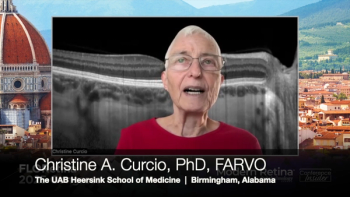
ASRS 2024: Real-world nAMD data demonstrate aflibercept 8 mg outcomes
Deepak Sambhara, MD, shared an overview of his paper-on-demand, which covered real-world safety and efficacy of aflibercept, 8 mg in the treatment of neovascular age-related macular degeneration at the annual ASRS meeting in Stockholm, Sweden.
Deepak Sambhara, MD, shared an overview of his paper-on-demand, which covered real-world safety and efficacy of aflibercept, 8 mg in the treatment of neovascular age-related macular degeneration at the annual ASRS meeting in Stockholm, Sweden.
Video Transcript:
Editor's note: The below transcript has been lightly edited for clarity.
Deepak Sambhara, MD:
Hi I'm Deepak Sambhara, Partner and Medical Director of Research at Eye Clinic of Wisconsin. We're here in Stockholm at the American Society of Retina Specialists meeting, where I had a chance to present a paper on demand, along with my co-authors and collaborators, David Eichenbaum, and Priya Vakharia, looking at real-world safety and efficacy of aflibercept, 8 mg in the treatment of neovascular age-related macular degeneration.
Now, as we're all aware, aflibercept 8milligram is the latest FDA approved anti-VEGF agent to treat neovascular AMD. This is really one of the first real-world data sets looking at the safety and durability and efficacy of the drug in a real-world population. We have 40 eyes from 33 patients who have at least 6 months of follow-up, and this is a really heavily treatment-experienced patient population with an average number of previous injections of around 30. These patients were indexed for efficacy based on visual acuity benchmarking, and OCT, using Heidelberg spectralis OCT hardware and software along with enhanced depth imaging to image the choroid, when available.
Now what we found was that patients who were switched to aflibercept 8 mg showed improvements both in visual acuity and anatomically as indexed by OCT with greater durability. Now my data set takes a deeper dive into switch data, looking at how patients do depending on what agents they're being switched from. And what we find out is that patients who are being switched from 2 mg aflibercept to 8 mg aflibercept, show a meaningful improvement in visual acuity, as well as anatomy on OCT, with greater durability. Going from on average, about 40 days since last injection to nearly 60 days since last injection when switched to aflibercept 8 mg. When you look at faricimab switch eyes; eyes that were switched from faricimab to aflibercept 8 mg. We really didn't find any meaningful difference, either in visual acuity or anatomy as indexed again by OCT.
Now, there are a couple of limitations to our dataset. Number 1 is that it's a retrospective case series. It's a smaller sample size, about 40 eyes only. And on average, patients who were switched from faricimab to aflibercept, only had about 2 injections of aflibercept 8 milligrams. So there are some limitations to the data set. But this is really one of the first real-world dives into how we've been consuming and using this medicine in our clinics on a day-to-day basis.
I think it's going to provide us with more context on how to move forward. We know number 1, this is a safe medicine. We didn't see any new safety signals or anything that was meaningful. Number 2, we know that it's efficacious, patients showed the ability to go longer between injections while maintaining vision and anatomy. And number 3, it is durable.
Newsletter
Get the essential updates shaping the future of pharma manufacturing and compliance—subscribe today to Pharmaceutical Technology and never miss a breakthrough.




























